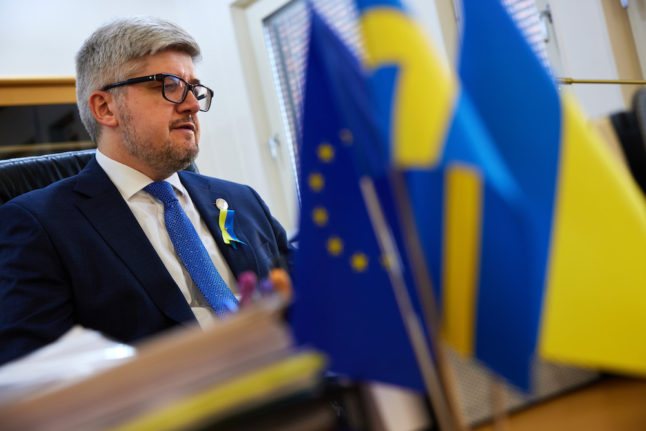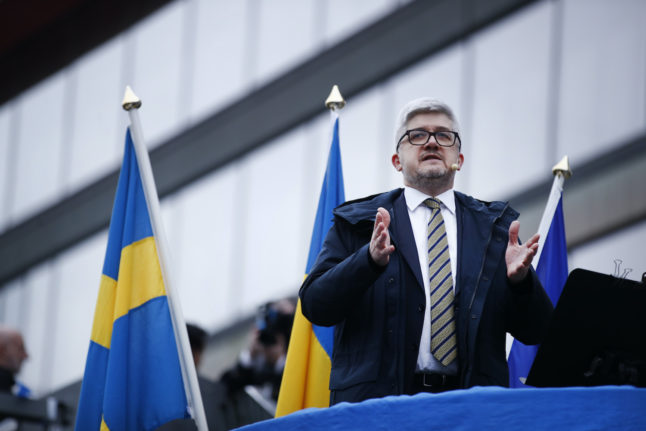Exactly a year ago today the world awoke to a new reality. After eight years of aggression in Crimea and Donbas, Russia amassed its troops on Ukraine’s borders and launched an all-out assault. Russia’s President Vladimir Putin expected the capital Kyiv to fall within days, but fast forward twelve months and the conflict has become a bloody war of attrition of a kind not seen in Europe since the two world wars.
Andrii Plakhotniuk is visibly moved when he thinks back to February 24th 2022.
“Everyone should understand that it was early in the morning. All the Ukrainian population was sleeping peacefully, some of them having colourful dreams like children, and all of a sudden we were hit by missiles,” he tells The Local.
Finding itself on a full war footing overnight, the ambassador explains how Ukrainian society immediately pulled together and adapted to the new reality.
“It’s like a miracle that our energetic nation, like all of our population – be it military, be it civilians, be it medical and social care workers, be it firefighters and police – they are doing heroic things every day. They are working day and night to help our country to survive during this war of aggression.”
As images spread of Russia wreaking brutal destruction on Ukraine, taboos fell all across Europe – nowhere more dramatically than in Sweden. Decades of opposition to Nato membership melted away within weeks, and the country quickly abandoned its principle of not sending arms to a country at war.
Ukrainian-Swedish relations, already robust before last year, “are becoming stronger and stronger every day.”
The ambassador points to a joint history going back 1,000 years, and nowhere is the countries’ close relationship more visible than in Ukraine’s Swedish-speaking village, Gammalsvenskby. Located in the Kherson region, which was declared Russian last year by Putin in a sham referendum, the village was occupied by Russian forces before being liberated by the Ukrainian army towards the end of 2022, but still faces “constant shelling”.
“It’s very important that Swedish society, Swedish people, support the local population there. They have very strong communication lines. They understand the basic needs and they are doing their best, providing generous donations, providing equipment, like energy equipment, and doing a lot of things to make the life of ordinary citizens there easier. And we are very grateful for that,” Plakhotniuk says.
Ambassador Plakhotniuk says he’s also thankful to Sweden for taking in some 50,000 Ukrainian refugees and is confident that Sweden will resolve persistent problems highlighted by charities and rights groups. Despite spiraling inflation, for example, refugees subside on a meagre allowance that hasn’t increased since 1994. And while they are eligible for introductory Swedish from Day One language tuition, the more comprehensive Swedish for Immigrants (SFI) classes remain off bounds. They’re also locked out of BankID, Sweden’s all-important digital identification system, as well as the Swish payment platform.
But the ambassador’s overriding sentiment is one of gratitude.
“We are so happy that many ordinary Swedes opened their doors and hearts to Ukrainians. This is the experience and this is the emotion that will never be forgotten by ordinary Ukrainians,” says Plakhotniuk.
At a symbolic level too, Sweden has opened the door to Ukraine as a long-standing advocate of its right to join the EU. And when Swedish Prime Minister Ulf Kristersson visited Kyiv last week for talks with President Volodymyr Zelenskyy, an eventual Ukrainian accession to the EU was high on the agenda.
“Now, when Sweden holds the presidency in the European Council, we have a lot of expectations that we could enter a new phase in our discussions and in our relations with the European Union,” says Plakhotniuk.
President Zelenskyy also thanked Sweden for sending some of the weaponry and military equipment it needs to succeed on the battlefield. The Ukrainian leader especially highlighted Sweden’s recent pledge to send Archers, a long-range artillery system that was high on Kyiv’s wish list.
“Everybody knows in Ukraine that when it comes to artillery systems, the Archer system is one of the most sophisticated,” says Plakhotniuk.
Similarly, the prowess of Sweden’s Gripen fighter jets is also common knowledge in Ukraine, the ambassador says. He acknowledges the complexities involved but is clear in his desire for more air defence support from coalition partners.
“It’s regarded as one of the very important further steps which will help us to protect our civilian population, because aviation can also be used to down missiles and to intercept missiles and enemy drones.”
Aside from military support, Sweden is also providing humanitarian aid and is “among the top five international suppliers” helping to restore an energy infrastructure repeatedly targeted by Russian attacks.
At an individual level too, people in Sweden have been generous with donations but Plakhotniuk notes that Ukraine needs the generosity to continue as the war rumbles on with no end in sight.
For anyone wishing to support Ukraine, the ambassador recommends donating to Ukraine’s official fundraising platform United 24, the Olena Zelenska Foundation with its focus on humanitarian aid, or other international humanitarian organisations.
“This work is very important and we ask all our friends all over to please continue to embrace Ukraine, support Ukraine, and we will soon celebrate our joint victory in Sweden.”
You can listen to the interview with Andrii Plakhotniuk in this week’s Sweden in Focus podcast, out on Saturday.



 Please whitelist us to continue reading.
Please whitelist us to continue reading.
Member comments